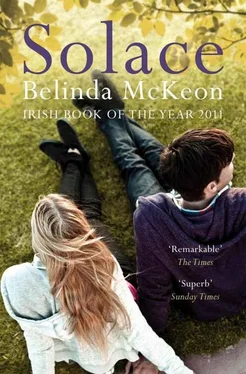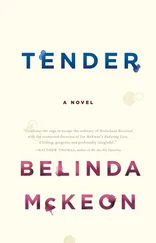But Mark was writing a doctorate on a nineteenth-century novelist, and when he finished it, he wanted to do the things that you did after you finished a doctorate on a nineteenth-century novelist: maybe write a book about a nineteenth-century novelist, maybe teach a course or two on nineteenth-century novelists, or maybe run the hell as far away from nineteenth-century novelists as he could. He didn’t know. He had to get his thesis finished first, and he had to publish many more papers, and present at many more conferences, and he had to ingratiate himself with the English departments of various universities, which was something he kept meaning to get around to but had not yet quite achieved. As a teacher — or, more accurately, as a teaching assistant — he suspected he was terrible; he had recognized, in his students’ eyes, the same slow dawn of scorn and incredulity of which he had been a master in his own undergraduate years. He suspected, too, that he was writing an appalling excuse for a thesis, but still he felt sure that he wanted to have a career as an academic, to spend his days reading and researching and writing, figuring things out and pinning things down. What those things were, he no longer felt sure, but they were the things he wanted to do; he knew. And he knew that what he did not want to do was to live in Dorvaragh, even half of the time, even a quarter of the time, and farm with his father, and fight with his father, and watch himself becoming more and more the image of his father every day. But still he could not turn his back on him. He could not refuse him. He tried to be honest with him — he told him, over and over, that his life would be in Dublin, and that his trips to the farm would be occasional, but they would be as often as he could manage, and that that was the most and the best he could do. He knew that, with his father, the words were not taking. But he could not find in that fact justification to stay away, justification for anything like a final break. And, besides, a final break was not something that he even knew how to want.
In all of this, Mark’s mother was sympathetic. She told him to do what he had to do, to concentrate on his own work, to take with a pinch of salt his father’s air of being winded by his leaving, confused by his inability to stay. And yet, after a couple of weeks had passed, she would be on the phone again, wondering when he would be coming down. In the spaces between her words he felt he could almost hear his father’s breath.
‘Monday,’ his mother had said on the phone that morning, when he had explained to her about the deadline. ‘Monday, you’ll be finished? Monday we’ll see you, so?’
He had said yes. Or he had made some noise that sounded like it. Then he had said goodbye and, looking to the clock radio beside his bed, he had discovered that there were technically three more hours left in the morning, despite the sharpness of the sunlight splaying itself through the blinds. He had slipped back into a heavy, dream-crazed sleep, and when he had gone down to the kitchen more than three hours later, Mossy had cooked breakfast and had planned for them both what he called a knockout of a day.
And this was the knockout. A back yard in the Liberties, barely bigger than the sitting room of their flat, heaving with the sun-blistered bodies of strangers and skangers and shits like Nagle, and a bar that looked populated entirely by jailbirds and jailbait, with a few pissed grandmothers and breastfeeding infants thrown into the mix. He knew he was kidding himself to think he’d get anything done now if he went back to the flat, back to his bedroom, where he’d set up an old kitchen table as his desk, across which his notes and books and printouts lay in the kind of neat and careful order that, in truth, only meant that he wasn’t working, that he hadn’t been working for some time. Because there was on that desk no sign of the scuffling and flittering and leafing and scrambling it took to really get through a piece of academic work, with its footnotes and its quotations and its weavings in and out of elements from every scrap of paper touched and filed and vanished over the course of long months and years. It would be useless, Mark thought, but he would be better off there, so he drained his pint and went to say goodbye to Mossy, pushing his way through the crowd, elbows and tummies and tits and arses and pint glasses raised and pint glasses slopping.
And talking to Mossy was a girl who made Mark decide, the instant he saw her, that he was staying where he was.
She was dark-haired. No: brown-haired, Mark saw, as she turned in the low slant of sun. Brown hair that looked heavy, the way it fell in its thick, loose curls. As she listened to whatever Mossy was saying now, she put a hand to her fringe, pushed it aside; she smiled, and Mark saw the gap in her smile, the sliver of nothing between her front teeth, and he swallowed.
She was tall. Almost Mossy’s height, and taller than either of the girls who were with her as she talked to him, standing beside her doing things with their handbags and their sunglasses and their phones, like people who were getting themselves organized to go somewhere. Like people who were leaving.
And she was leaving. That was what she was saying to Mossy now, Mark could hear, as he came close; that she was heading, that she would see Mossy later, that he was to text her if he couldn’t find the house. And then she was coming towards Mark, and when she saw him, as she passed him, she was smiling.
‘Hiya,’ she said, and he saw that her eyes were green. And she was gone. He nodded a response, but too late for her to see; one of her friends saw instead, and gave him a strange look. They must have been the girls Nagle had turned to when he and Mossy went into the bar, Mark realized. They must have been the ones at the next table. He tried to remember. Had he noticed her? He would have noticed her. He would have stared. Staring would have been a better use of his afternoon. Talking to her would have been better still. What had he been doing? Talking shite to Mossy, taking shite from Nagle? He raised his eyebrows as he handed Mossy his pint.
‘What?’ Mossy said, innocently.
‘What yourself?’ Mark said. ‘What was that about?’
‘That girl?’
‘Yeah, that girl. Who is she?’
‘Joanne. Comes into Laser a lot. Gets the new releases. Nice girl. Training to be a solicitor. Joanne.’
‘I heard you the first time.’
‘Yeah, well,’ said Mossy, and he stretched. He looked lazy, unbothered, almost post-coital; either he’d slept with her already, or he was utterly confident of sleeping with her soon. Mossy scored whenever he wanted to score. Mark did not do too badly — at least, he liked to think of it that way — but Mossy was always miles ahead. It was the accent, or it was the wild head of hair, or it was the fact that he could speak Irish, or something. Mark didn’t know what it was. But it worked. There were weeks when he bumped into two or three different women in the morning. Not on the same morning. But even that he wouldn’t put past Mossy. Even in their first year in college, when everyone was talking about it and nobody was getting it, Mossy had been getting it. And he didn’t brag about it. He barely ever talked about it. But he got it. And now it looked like he was on track with this girl. He yawned. Mark wanted to give him a dig in the stomach.
‘So you’re meeting up with her later?’
Mossy took a drag from his cigarette. ‘We’re going to a party,’ he said. ‘Some of her solicitor friends just bought a house out in Booterstown. Mustn’t mind the place getting trashed already, I don’t know. Or maybe they’re just desperate for a lawsuit.’ He laughed, and Nagle brayingly joined in.
Читать дальше












